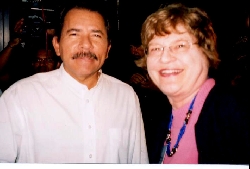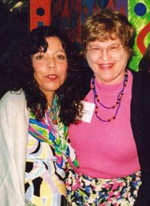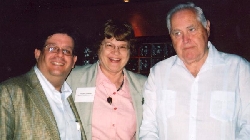University News
WIU History Professor Meets Nicaragua's Newest President, Daniel Ortega
January 8, 2007
MACOMB, IL - - Western Illinois University history Professor Virginia Leonard knew she was going to be presenting with some notable Nicaraguans at the 56th Annual Conference of the Midwest Association of Latin American Studies (MALAS), which was held in Managua, Nicaragua in November.
What was a surprise to her and her colleagues was an opportunity to spend 90-minutes with Daniel Ortega, who will be installed as president of Nicaragua Jan. 10, at the Sandinista National Liberation Front headquarters (Frente Sandinista de Liberacion Nacional - FSLN).
"It was an interesting experience and obviously well-scripted from Ortega's camp," Leonard said. "He definitely had a message to send to the Bush Administration, that Nicaragua wants to get along with the U.S. In fact, Ortega hopes that the U.S. will lead an effort to establish a common market for the Americas, along the lines of the European Union, rather than by expanding NAFTA (North American Free Trade Agreement)."
The country's major newspapers, La Prensa and El Nuevo Diario, covered the Ortega-MALAS meeting for three days following the event, and it was a major item in the electronic media bulletin Bolsa de Noticas, she added.
Ortega's wife, Rosario Murillo, is an active partner in his political life and in the FSLN, according to Leonard. Personable and outgoing, she had everything decorated in pink instead of red, the color associated with the former Sandinista regime, she added.
Ortega, a leader of the Sandinista Revolution that overthrew Somoza in July 1979, served as Nicaragua's president from 1985-1990 in a controversial term fraught with internal dissent, socialist policies and Nicaragua-U.S. hostility. He was unsuccessful in three bids for re-election in 1990, 1996 and 2001, losing to Violeta Chamorro, Arnoldo Aleman and Enrique Bolanos.
"Ortega is trying to appear more conservative and has publicly supported the outlawing of abortion to propitiate the Roman Catholic Church," Leonard said. "And while the people may be a little sacred of what he might do as president, they hope he has matured.
"Nicaraguans pointed out that his vice-presidential running mate was a businessman whose house was expropriated by Ortega in 1979. (Ortega compensated him later.) Three very major differences now are that the Sandinistas no longer control the military, police and Congress," she added.
Nicaragua, which is approximately the size of Iowa, is the poorest country in Central America, and juvenile gangs, or "pandillas," are an alarming problem. Forty-one percent of the country is considered rural, and 80 percent of Nicaraguans live below $2 per day. Happily, its 5.6 million people and multiple political organizations are now living in relative social harmony, Leonard said.
For example, sessions of MALAS were attended by Sandinistas and former contras, once opponents. Another presenter was Carlos Fernando Chamorro, the son of former president Violeta Chamorro, who defeated Ortega in 1990. He once edited the official Sandinista newspaper La Barricada, 1979-94, and has since broken with the Sandinistas, Leonard explained.
Leonard's session dealt with 19th century Latin America, and she presented a paper on "The U.S. Navy in Latin America in the 19th Century: Cultural Observations."
Leonard, who joined Western's history faculty in 1977, earned her degrees at the University of California, Berkeley (B.A., 1963), Hofstra University (M.A., 1966) and the University of Florida (Ph.D., 1975).
Posted By: University Communications (U-Communications@wiu.edu)
Office of University Communications & Marketing




Connect with us: